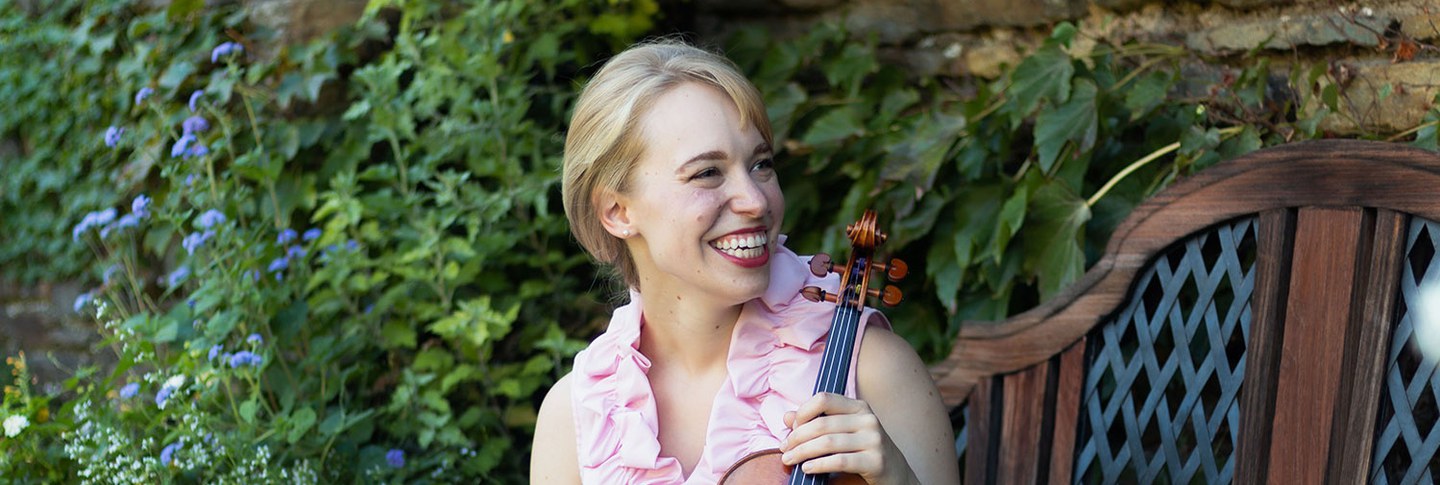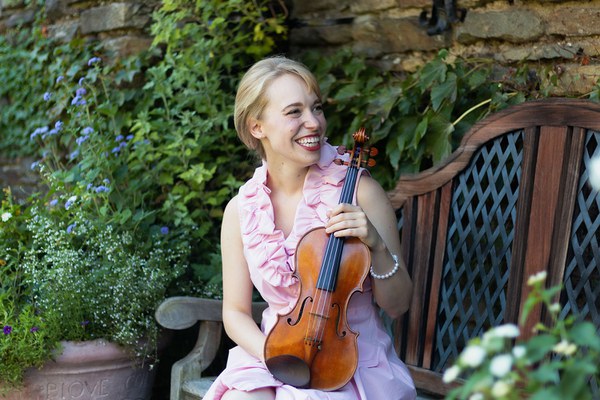What is an encore? Today when we think of the word “encore,” we think of a spontaneous performance that follows a planned performance. Typically short and appealing in nature, today’s encore reads as something small and delightful to cleanse the palate or, like a piece of musical dessert, to indulge further in the performance experience. Though encores often allude to a seemingly simpler time, I have discovered during my research at Dumbarton Oaks that this practice of “musical dessert” is very much a modern invention. It has resulted from centuries of tension between Romanticism, industrialization, individualization, commercial necessity, and the rigid museum culture of classical music performance practice.
I am a violinist, not a trained scholar. In the real world, my life consists of practicing, teaching, rehearsing, and performing. My signature performances to date have been my original multimedia performance projects, the most recent one being CIACCONA: The Bass of Time. These multimedia projects have become a cornerstone of my performing career, but they require tremendous resources to create: access to historical sources and valuable time to learn the program, study the history, write the script, gather the images, and put it all together. So when Dumbarton Oaks approached me to be the Fall 2019 Early-Career Musician in Residence, I jumped at the opportunity to develop a brand-new multimedia project entitled Encore! Just One More . . .
It is impossible to say when the practice of encores began. Just like the impulse to have one more bite of something delicious, surely the desire to repeat something enjoyable is part of human nature. It’s easy to imagine a small French child long ago begging their parents to sing their favorite song again: “encore!” But exactly when this practice entered public performance, there’s no point in speculating. I was delighted in my studies to find the first record of an encore in public performance in the London daily newspaper The Spectator, published on February 29, 1712. In a letter to the editor attributed to one Mr. Toby Rentfree, the author describes his experience at an opera and expresses his indignation that his request for an “encore” of a dramatic fight scene was denied, although other musical “encore” demands were heeded. (Mr. Rentfree was likely a satirical character invented by the editor, intended to mock those less experienced concertgoers who came for the spectacle rather than the art. Classical music snobs have been around forever.)
From these early operatic indulgences, I have traced the history of encores through the lens of violin repertoire, from early Italian virtuosity through Romantic Parisian salon concerts to post-World War I artistic nostalgia and even early American television. I have learned the stories of artists I have admired since I was small: musicians like Niccolò Paganini, a nineteenth-century rockstar and the inventor of modern showbiz; Henryk Wieniawski, a virtuoso seeking a career in a changing musical landscape after Paganini and Chopin; Fritz Kreisler, a twentieth-century violinist celebrity with a habit of inventing fibs that got him into trouble; and even Jack Benny, the famous radio personality who made a career out of self-deprecation and playing the violin “badly.”
My favorite research inquiry has been studying violinist Florian ZaBach, whose encore “The Hot Canary” might be my very favorite. ZaBach was a fabulous violinist at the forefront of mid-century popular music, though he has been largely buried under the diverging roads of classical and popular music. His 1955 television show on CBS earned him a star on the Hollywood Walk of Fame and he appeared as a guest on the Tonight Show more than 25 times, yet I could not find any substantive information about him. I was excited to find the Library of Congress’s unprocessed “Florian ZaBach Special Collection,” and I am proud to say I have been working with a team there to begin cataloguing ZaBach’s recordings, videos, and sheet music. It has been enormously gratifying to begin bringing this special artist back to the fore, and I am excited to showcase his work.
I’m eager to share my findings with the musical community and audiences everywhere, so following my residency, my plan is to record and tour Encore! Just One More . . . in seasons to come. My project could not have happened without the support of my colleagues here at Dumbarton Oaks, and I know that anywhere I go from here will be the result of this incredible opportunity. I will be forever grateful for the community, time, and support I’ve enjoyed at DO, and I can’t wait to see what comes next.
Robyn Bollinger is the Fall 2019 Early-Career Musician in Residence. Photo by Elizabeth Muñoz Huber, postgraduate digital media fellow.

